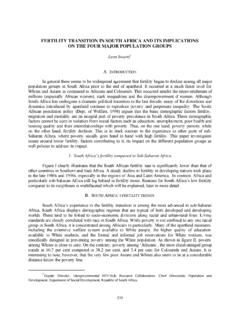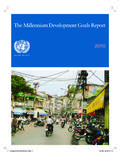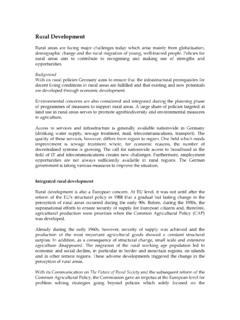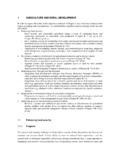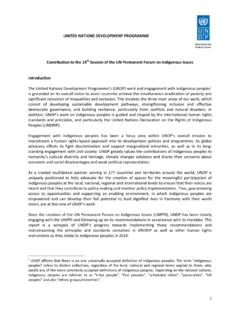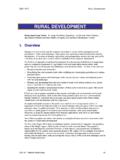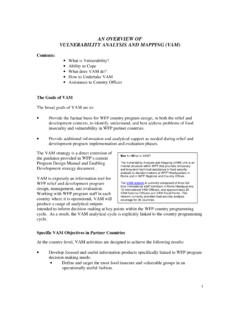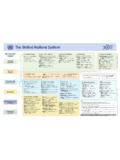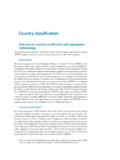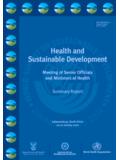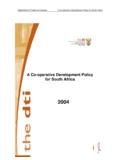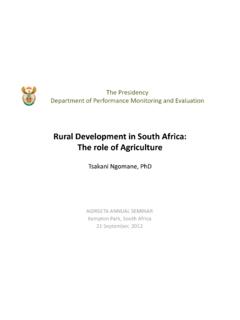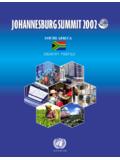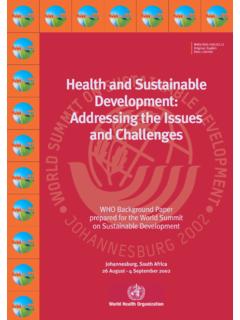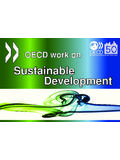Transcription of South Africa-Atmospheric Pollution & Climate …
1 DEPARTMENT OF ENVIRONMENTAL AFFAIRS AND TOURISM. South africa . COUNTRY REPORT. FOURTEENTH SESSION OF THE. united nations COMMISSION ON. sustainable development . SEPTEMBER 2005. List of Acronyms AGOA africa Growth and Opportunity Act APINA Air Pollution Information Network for africa AQA Air Quality Act AQMP Air quality management plan AU African Union BCI Business Confidence Index BEE Black Economic Empowerment BFP Basic Fuels Price BNM Basa Njengo Magogo alternative fire lighting method BPO Business process outsourcing CABEERE Capacity Building in Energy Efficiency and Renewable Energy CAPCO Chief Air Pollution Control Officer CAPEX Capital Expenditure Programme CBO's Community based organisations CCP Cities for Climate Protection CDM Clean development Mechanism CERS Certified Emission Reductions CEF Central Energy Fund CFC's Chlorofluorocarbons CFL's Compact fluorescent lights CO carbon monoxide CONNEP Consultative National Environmental Policy Process CIF Critical Infrastructure Fund CP Cleaner Production CSD Commission on sustainable development CSIR Council for Scientific and Industrial Research DBSA
2 development Bank of Southern africa DEAT Department of Environment and Tourism DoH Department of Housing DME Department of Minerals and Energy DNA Designated National Authority office DSM Demand Side Management The dti Department of Trade and Industry ECA Economic Commission for africa EDI Electricity Distribution Industry EDRC Energy and development Research Centre EMIA Export Marketing and Investment Assistance EMM Ekurhuleni Metropolitan Municipality EIA Environmental Impact Assessment EU European Union FNB First National Bank GATT General Agreement on Tariffs and Trade GCCC Government Committee on Climate Change GDP Gross Domestic Product GEF Global Environment Facility GODISA Programme to stimulate technology transfer. GTZ German Technical Co-operation Organization GVEP Global Village Energy Partnership GWh Giga Watt Hours ICLEI International Council for Local Environmental Initiatives ICT Information and communications technologies IP Illuminating paraffin IDC Industrial development Corporation IeC Integrated Energy Centre IP&WM Integrated Pollution and Waste Management Policy JSE Johannesburg Stock Exchange LRP Lead Replacement Petrol LPG Liquefied Petroleum Gas MEC Member of the Executive Council MFRC Micro Finance Regulatory Council Mtoe Million tonnes of oil equivalent MW Mega Watt NAAMSA National Association of Automobile Manufacturers of South africa NAQMP National Air Quality Management Programme NCCC National committee on Climate Change NCPC National Cleaner Production Centre South africa NEDLAC National Economic development and Labour Council NELF National Electrification Forum NEMA National Environmental Management Act (Act No.)
3 107 of 1998). NEPAD New Partnership for africa 's development NER National Electricity Regulator NERI National Energy Research Institute NERSA South African National Energy Regulator NGO Non-governmental organisation NLR National Loans Register NSI National System of Innovation NTTC National Technology Transfer Centre OAU Organisation of African Unity PBMR Pebble-bed modular reactor PFMA Public Finance Management Act ProBEC Program for Biomass Energy Conservation in Southern africa PUC Productive Use Container R&D Research and development RDP Reconstruction and development Programme REDs Regional Electricity Distributors SA South africa SACEF South African Competition Economics Forum SACN South African Cities Network SACOB South African Council of Business SADC Southern African development Community SALGA South African Local Government Association SANS South African National Standards Sapia South African Petroleum Industry Association SAPP Southern
4 African Power Pool SARS South African Revenue Services SEA sustainable Energy africa SET Science, Engineering and Technology SETAS Sector Education and Training Authorities SEDA Small Enterprise development Agency SEI Stockholm Environment Institute SETA Skills Education & Training Authorities STEM Short-term energy market Sida Swedish International development Cooperation Agency SIP Strategic Industrial Projects SMEDP Small and Medium development Programme SMMDP Small and Medium Manufacturing development Programme SME Small and medium enterprises SMME Small, medium and micro enterprises SPII Support Programme for Industrial Innovation SSA Sub-saharan africa TAU Technical and Administrative Unit THS Tax holiday scheme THRIP Technology and Human Resources for Industry Programme TIASA Thermal Insulation Association TMM Tshwane Metropolitan Municipality TSP Technology Stations Programme TWIB Technology for Women in Business UN united nations UNDP united nations development Programme UNEP united nations Environment Programme UNFCCC UN Framework Convention on Climate Change UNIDO united nations development Organisation USA united States of America VAT Value added tax W Watt WOESA Women in Oil and Energy WTO World Trade Organisation WINSA Women in Nuclear Introduction The united nations Commission on sustainable development (CSD) was created in to ensure effective follow-up of the united nations Conference on Environment and development (UNCED).
5 To monitor and report on implementation of the Earth Summit agreements at the local, national, regional and international levels. The mandate of the commission was reaffirmed by the World Summit on sustainable development held in Johannesburg in 2002. At its eleventh session, the Commission on sustainable development decided that its multi-year programme of work beyond 2003 would be organized on the basis of two-year cycles, with each cycle focusing on selected thematic clusters of issues. CSD 11 further encouraged countries to provide national reports, on a voluntary basis, for every review session on the thematic clusters of issues reflecting the overall progress, trends and emerging issues as well as constraints and challenges. The CSD also invited the Secretariat of the Commission to improve on reporting guidelines and questionnaires with the intention of making reporting more efficient and less cumbersome on countries and more focused on implementation.
6 The united nations Division for Economic and Social Affairs (UNDESA) has requested national focal points to submit country reports as a contribution to the Secretary General's Report for CSD 14, which focuses on the thematic cluster of Industrial development , Climate Change Air Pollution /Atmosphere and Energy for sustainable development This report is the South African country report to the Commission, which reports on the progress made in the implementation of Agenda 21 with regard to the review, evaluation and monitoring processes. It specifically focuses Industrial development , Climate Change Air Pollution /Atmosphere and Energy for sustainable development . The key elements of the CSD- 12 Report include a reflection on lessons learnt, best practice, the identification of actions, opportunities and constraints to the implementation of sustainable development and to the formulation of the NSDS. This report was developed through a rigorous intergovernmental process coordinated by the Department of Environmental Affairs and Tourism with the support of the department of Trade and Industry, the Department of Foreign Affairs, the Department of Mineral and Energy and the Department of Health.
7 The development of the report included consultations and numerous written submissions from representatives of major groups, organised business and labour. This report is globally applicable within a national and even a local context and it was developed through a methodology that does not simply comply with the request from the united nations but with and to strengthen the sustainable development Agenda in South africa . I. Overview 1. atmospheric Pollution and Climate Change Concrete actions taken and progress made in implementation Following South africa 's re-acceptance into the international community (both politically and economically) and its adoption of a progressive Constitution and Bill of Rights, the policy approaches to environmental regulation and management in South africa have changed substantially. This has been undertaken with a view, inter alia, to giving effect to sustainable development and to providing some alignment with international trends.
8 The National Environment Management: Air Quality Act (2004) reformed the law regulating air quality in order to protect the environment by providing reasonable measures for the prevention of Pollution and ecological degradation and for securing ecologically sustainable development while promoting justifiable economic and social development ; to provide for national norms and standards regulating air quality monitoring, management and control by all spheres of government; for specific air quality measures. An important standard for air quality (SANS 1929) was published in January 2005. SANS 1929. gives limit values for common air pollutants to ensure that the negative effects of such pollutants on human health is prevented or reduced. Another standard linked to air quality, albeit from an automotive regulatory perspective, is SANS 20049, which is concerned with the emissions of pollutants from different categories of motor vehicles. The Climate Change Response Strategy, launched in October 2004, outlines the framework of how South africa should respond to Climate change.
9 Due to the crosscutting nature of Climate change, DEAT has established two formal committees where other government departments are represented. These are the Government Committee on Climate Change (GCCC); and the National committee on Climate Change (NCCC, where all impacted and affected parties are represented). These two bodies coordinate Climate change issues, including the implementation of the Climate Change Response Strategy, across all relevant government departments. South africa ratified the united nations Framework on Climate Change in August 1997 and acceded to the Kyoto Protocol in March 2002 as a non-Annex 1 signatory. Annex 1 countries are committed to a 5% overall reduction in the period 2008 2012. Although South africa does not have a national air quality problem, a number of air Pollution hot spots exist around the country where severe air quality problems occur. The Air Quality Act contains specific provisions to deal with these problem areas the so-called Priority Area.
10 Provisions. Since the publication of government's Integrated Pollution and Waste Management policy in 2000, government has been implementing the National Air Quality Management Programme 2000 2010 (NAQMP) . The programme is divided into four phases with each phase providing the foundation and/or input into the next phase. The NAQMP provides a starting point for the development of the National Air Quality Management Framework required by the Air Quality Act. Phase 1 has focussed on translating the Integrated Pollution and Waste Management Policy into a strategy and initial implementation action plan for air quality management for the country. The Phase II (Transition) is also underway and phase III (Capacity development ) and Phase IV. (Maintenance and Review) will follow. Currently, industrial emissions are regulated by the Chief Air Pollution Control Officer (CAPCO) of the DEAT. Registration certificates for individual industries are issued by CAPCO, which state the actual quantity of particulate emissions that may be emitted as well as the level of emission allowed.
